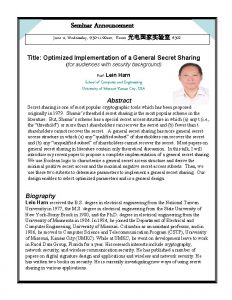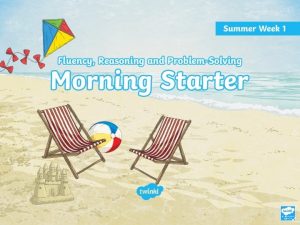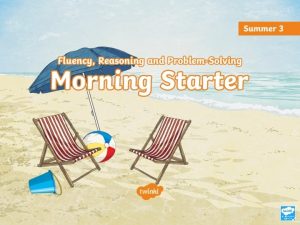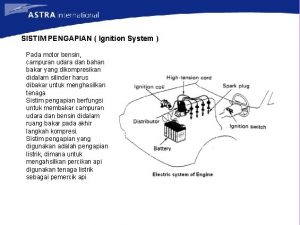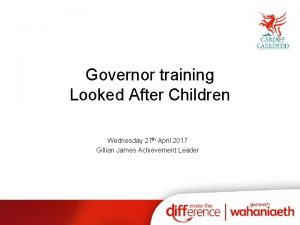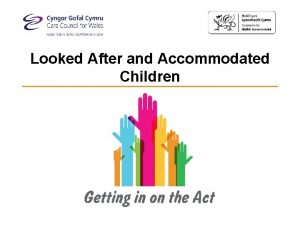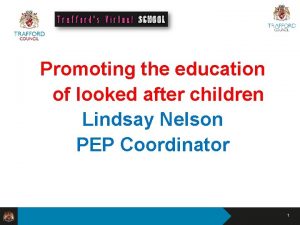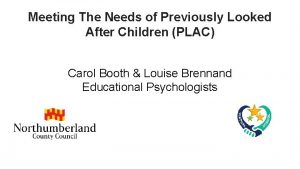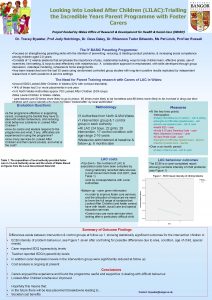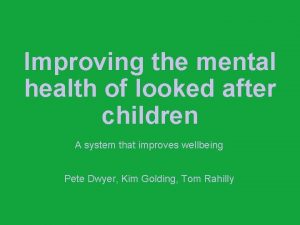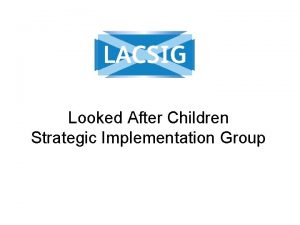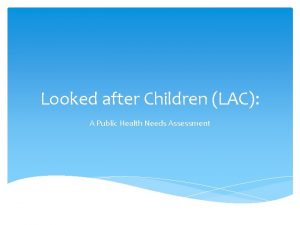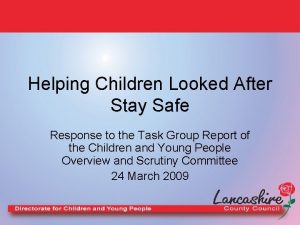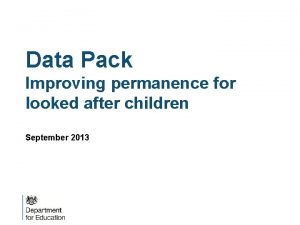Governor training Looked After Children Wednesday 27 th













































- Slides: 45

Governor training Looked After Children Wednesday 27 th April 2017 Gillian James Achievement Leader

Objectives 1. To have a clearer understanding of the background and needs of a Looked After Child 2. To understand our role as corporate parent 3. To learn about services that support Looked After Children in Cardiff 4. To learn how you can support your school to do their best for Looked After Children 5. To take away personal learning and put into action

Some facts • 5, 755 children were looked after by Welsh local authorities at 31 March 2014 • 5, 250 of these children were identified as white In 2013 : • 90% of children who are looked after aged 5 -15 are in mainstream schools • 10% of children who are looked after aged 5 -15 are in special schools • 13% who are looked after have a disability • 66% of children who are LAC have some form of special educational needs (SEN)

There is a gap in educational outcomes of children that are looked after at every key stage Stage Pupils in Wales Looked After Children Foundation Phase 83% 53% Key Stage 2 CSI 84% 53% Key Stage 3 CSI 77% 36% Key stage 4: 5 GCSEs at Grade A* -C in English or Welsh first Language and Mathematics 53% 13%

Comparative performance of Looked After Children Cardiff LAC Wales 2015 Children in need census 2015 Cardiff LAC 2016 Cardiff All Pupils 2016 Cardiff LAC OOC Foundation Phase Outcome Indicator 75% 64% 89% 88. 9% 50% Key Stage 2 Core Subject Indicator 56% 64% 68% 89. 5% 75% Key Stage 3 Core Subject Indicator 38% 47% 87% 63% Key Stage 4 Level 2+ Threshold 17. 1% 18% 21% 62% 17%

Quiz • How many Looked After Children are there in Cardiff? 1. 502 2. 589 3. 720 4. 649

Quiz How many looked After Children in Cardiff are educated out of county? Approximately: • 200 • 300 • 400

Quiz • Which answers match to which age range? 195; 139; 162; 0; 151 • 0– 4 16 – 17 5 – 10 18+ 11 – 15

Quiz • 1. 2. 3. 4. How many Looked After Children have a Disability? 9 20 35 41

Quiz • 1. 2. 3. 4. How many children and young people are unaccompanied asylum seekers? 0 5 10 15

How Many Looked After Children are from Ethnic Minorities? Any other ethnic origin (please specify) Any other mixed background Asian - any other background Asian British Bangladeshi Black - other background Black African Black British Black Caribbean Chinese Gypsy Traveller Ethnic Groups / Any other ethnic origin (please specify) Indian Not stated NULL Pakistani Refused to disclose White - other background White and Asian White and Black African White and Black Caribbean White British White European White Irish Total 18 19 10 5 5 5 21 0 5 0 0 0 5 23 0 15 10 22 11 10 19 438 12 0 654

What is Corporate Parenting? The “Official” Definition Corporate Parenting is ‘The collective responsibility across services and across local authorities, to safeguard and promote the life chances of looked after children’

Activity ‘Voice of the child’ discussion: • Think of a child you know well – as a parent, what activities would you support that child in, every day, every week, every month? • What would you do to ensure your child has a happy and fulfilled life? • How do you know that you’re a good corporate parent? • If this were my child….

A Looked After Child’s Story

If this were my child……. • When you became a Governor you also became responsible for ensuring that the school acts as good ‘corporate parents’ for all the looked after children they have on role • The role of the corporate parent is to seek for children in public care the outcomes every good parent would want for their own children.

A Good Corporate Parent Means… • …doing more than fulfilling statutory duties • …doing your best for looked after children and care leavers in your school • …wanting your children and young people to be happy, healthy and safe from harm; to have positive experiences in your school • …helping children to enjoy themselves

A Good Corporate Parent Should… • …help young people to maximize their potential by providing or assisting in finding employment, higher and further education or apprenticeships • …ensure the provision for children and young people of secure, lasting and loving relationships • …act as a guardian • …take their corporate parenting responsibilities seriously

Corporate Parenting- Why is it important? Every child and young person in Wales has rights as outlined by the UNCRC. These rights include: Educational attainment (Article 29) Participation (Article 12) Confidence (Article 14) Health (Article 24) Wellbeing (Article 19) Good corporate parenting will ensure that looked after children have the same access to their rights and ultimately the same life chances as other children in Wales.

Activity ‘Experience of the child’ • Think of examples of why a child or young person might become looked after?

Activity How do you, and we, ensure only the children that need to be are those that are looked after?

Key documents/legislation • Towards a Stable Life and a Brighter Future – June 2007 • Social Services and Well-being (Wales) Act 2014 • Draft Additional Learning Need and Education Tribunal (Wales) Bill • Raising the ambitions and educational attainment of children who are looked after (Jan 2016)

Key messages from Young People in Cardiff: �Young people want to be consulted and want their opinions to be considered. �Contact is a key issue for young people, and they need to understand the reasons behind agreed contact arrangements (e. g. when contact is supervised / frequency of contact). �Young people do not like the acronym “LAC” as it suggests they are lacking something. �The Pathway Plan is an important document.

The When I’m Ready scheme has three main objectives: • provide stability and continuity for young people leaving foster care as they prepare for independence • improve the life-chances of our Looked After Children • ensure Looked After Children and Care Leavers can exercise their voice and have control over the decisions that affect their lives.

Corporate Parenting Strategy Aim - We want children and young people in our care to have the best possible life experiences, to be safe, happy and healthy, and achieve their full potential at school and in the future. We want to do this in collaboration with our partner agencies and where possible with families. And where it is safe to do so, we want children to remain at home with their parents or extended families with effective support services.

• For good outcomes for looked after children to be achieved and costs controlled in the long term it is essential that a long term strategic approach is maintained. • Development of more integrated and effective preventative services is needed to ensure that children do not become looked after unnecessarily and, when they do become looked after, to reunite them with their families successfully wherever possible. • Preventative services must take a whole family approach and assess health, education, housing and social care needs in order to improve outcomes and avoid escalating costs.

Raising the ambitions and educational attainment of children who are looked after in Wales

‘There is clear evidence that the education system is failing to support children who are looked after effectively’ ‘There has been progress in supporting children who are looked after to reach their academic potential, but the impact has been marginal and the pace of improvement has been too slow’

WG framework for future action: • raise the educational aspirations and attainment of children who are looked after and the ability of those who care for them to support their educational development • reinforce the collective accountability and effective leadership across the WG, local authorities, schools, further and higher education institutions for the educational outcomes of children who are looked after • make education apriority and a point of focus, especially during the periods of upheaval and uncertainty that can happen in the life of children who are looked after • identify data that will aid practice, policy making and monitoring of educational outcomes • ensure excellent practice is identified, promoted and shared where it exists

• ‘We must work towards these objectives with urgency. Another year cannot pass where systems and structures we have put in place allows for a single looked after child to have an unsatisfactory educational experience and miss out on opportunities to fulfil their true potential’

Defining attainment Using a number of common measures: Level 2 inclusive (L 2 inc) refers to the achievement of a volume of qualifications equivalent to 5 GCSEs at grade A* to C including English or Welsh First Language and Mathematics Core Subject Indicator (CSI) refers to the achievement of the expected level in each English or Welsh Language, Mathematics and Science at the end of a key stage The expected level at the end of: • Foundation Phase is Foundation Phase Outcome 5 • Key Stage 2 is National Curriculum Level 4 • Key Stage 3 is National Curriculum Level 5

‘ensure that the learner’s progress is properly tracked , so that interventions are quickly applied where attainment appears to be in decline’ So in Cardiff we have set up a virtual school and our aim is to: • Track pupils on a termly basis • In partnership with schools identify underachievement, identify the barrier to underachievement and ensure intervention /s recorded and progress is made

The Children Act 2004 (Section 52) places a positive duty on responsible authorities to promote the educational achievement of Looked After Children : • Appoint Looked After Education Coordinators • Every child should have a high quality Personal Education Plan (PEP)

The LACE team based in Education

Personal Education Plans (PEPs) • Wherever the child is place, his/her social worker MUST take the lead to: - initiate a PEP, as part of the Care Plan, irrespective of whether the child has a school place or not

What is a PEP? ‘ A tool to support personalised learning of the child reflecting educational needs/ views and ambitions’ • Sets clear goals or targets relating to their achievements, out of school activities and personal/behavioural targets • MUST involve the child, parent and /or family member and carer • Completed in partnership with key people in the child’s life

And……. . • Is an achievement record • Includes a history of educational placements • Is linked to other education plans e. g. Individual Education Plans (IEPs) • Identifies additional needs, e. g. developmental, educational, behavioural and emotional needs • Records short and long term targets • Identifies the support required and how it will be provided

And ……. • Identifies and plans for transitions in particular movement to higher education, employment and training • Considers out of school life and engagement in positive activities • Monitors attendance

What makes a good PEP? • • Listens to the voice of the child Timely Detailed Contains all requested data Clear, relevant but achievable goals Linked to notes recorded in the PEP Takes account of views of all key people e. g. foster carer, school staff, social worker and other key professionals • Is holistic • Plans and records the aspirations for the child’s future

What does good provision in school look like for Looked After Children look like?


Some questions to answer as a governor • Who is the Looked After Children’s designated teacher in your school? • Is the LAC designated teacher tracking, monitoring and challenging where necessary the progress of Looked After pupils? • What has your school got in place to consider the well being of Looked After pupils? • Is there a designated governor for Looked After Children on the governing body? • Is the designated teacher reporting the progress of Looked After pupils on a regular basis?

• What additional support and intervention is in place for the LAC pupils in the school? • Are the attendance and any exclusions of the Looked After pupils being monitored? • Are the views of the Looked After pupils sought, valued and used to inform appropriate provision? • Is the school involving, communicating and working in partnership with the foster carers or children’s home? • Are the Personal Education Plans (PEPs) up to date and of good quality? • Is the governing body challenging under-performance of Looked After pupils? • Has the governing body accessed training to understand fully their responsibilities in working with this vulnerable group of young people?

Two things to take away • Remember we all need to go the ‘extra mile’ for Looked After Children in our schools • As a governor you can be a ‘champion’ of Looked After pupils in your school to ensure that they get the best possible school experience

• Consider 3 things you will do following on from today’s workshop

Thank you for listening Debbie Martin- Jones DMartin. Jones@cardiff. gov. uk Gillian James - Gill. James@Cardiff. gov. uk
 After me after me after me
After me after me after me John 14:1
John 14:1 Jose rizal childhood memories
Jose rizal childhood memories I wish id looked after me teeth poem
I wish id looked after me teeth poem Sheffield development hub login
Sheffield development hub login Monday tuesday wednesday thursday friday calendar
Monday tuesday wednesday thursday friday calendar Wednesday evening prayer
Wednesday evening prayer Wednesday seminar
Wednesday seminar Ib grades to percentage
Ib grades to percentage Michelle hansberry
Michelle hansberry Wednesday diary
Wednesday diary Happy wednesday february
Happy wednesday february My favourite day is monday
My favourite day is monday Skinny wednesday
Skinny wednesday Pat winlink
Pat winlink Monday inglês
Monday inglês Wise wednesday
Wise wednesday Happy wednesday march
Happy wednesday march Monday tuesday wednesday thursday friday saturday sunday
Monday tuesday wednesday thursday friday saturday sunday English class is wednesday
English class is wednesday Wednesday writing prompts
Wednesday writing prompts Tuesday bell work
Tuesday bell work Wednesday bellringer
Wednesday bellringer Marvelous monday terrific tuesday wonderful wednesday
Marvelous monday terrific tuesday wonderful wednesday Enum day sunday=1 monday tuesday=5
Enum day sunday=1 monday tuesday=5 Wednesday bellwork
Wednesday bellwork Wednesday good morning
Wednesday good morning King forever
King forever Wednesday bell ringer
Wednesday bell ringer Wednesday syllables
Wednesday syllables Wednesday lunch
Wednesday lunch Happy wednesday
Happy wednesday Happy wednesday
Happy wednesday Thursday prayer
Thursday prayer Fe exam results wednesday
Fe exam results wednesday Wednesday phonics
Wednesday phonics Sunday monday tuesday wednesday
Sunday monday tuesday wednesday Monday=621 tuesday=732 wednesday=933
Monday=621 tuesday=732 wednesday=933 Monday=621 tuesday=732 wednesday=933
Monday=621 tuesday=732 wednesday=933 Wednesday lo
Wednesday lo Wednesday at 6
Wednesday at 6 Wednesday two of the key
Wednesday two of the key Wednesday
Wednesday Role of send governor
Role of send governor Fungsi dari centrifugal governor advancer adalah
Fungsi dari centrifugal governor advancer adalah Rc helicopter governor
Rc helicopter governor







